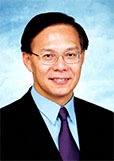
Ir Mak Chai Kwong graduated from The University of Hong Kong (HKU) with a BSc degree in Engineering in 1973, and an MSc degree in Urban Planning in 1985. A civil engineer by profession, he was a loyal civil servant. He was the Permanent Secretary for Development (Works) before he retired in June 2010, after completing his 37-year career with the government. After retirement, he was appointed Team Leader for Sichuan Reconstruction in the Development Bureau responsible for the HKSAR funded post-earthquake reconstruction work in Sichuan.
Ir Mak was instrumental in the development of many major infrastructural projects in Hong Kong, such as the modernization of the Kowloon Canton Railway, studies to formulate Hong Kong’s railway network expansion, various road projects including Route 8 and the Stonecutters Bridge, the Hong Kong-Shenzhen Western Corridor and the mega Hong Kong-Zhuhai-Macao Bridge. He also led the heritage team in the Development Bureau in implementing heritage conservation projects.
Ir Mak is visionary, and keenly supports innovation and knowledge transfer. As the Director of Highways, he led the Department in collaborating with tertiary institutions on various research works. The collaboration between PolyU and the Highways Department produced very worthwhile outcomes on “Highway Pavement Design” and “Road Pavement Materials.” The applied research on “Bridge Health Monitoring System” was a notable achievement. The system has been applied to the Tsing Ma Bridge and other long-span bridges, and high-rise structures.
Ir Mak has spared no effort in serving the university community, and in contributing significantly to the nurturing of professional engineers. He has been lecturing at his alma mater, HKU, for over 25 years and was awarded Honorary Professorship in the Civil Engineering Department, HKU in 2007. He served as the Chairman of the Advisory Committee on Civil and Structural Engineering at PolyU between 2008 and 2011; the Chairman of the Advisory Committee for the Department of Architectural Engineering of the City University of Hong Kong; a member of the University Engineering Advisory Committee and the Vice-Chairman of the Management Committee of the Centre of Infrastructure and Construction Industry Development at HKU.
Ir Mak was awarded the Gold Bauhinia Star in 2010, and was appointed a Director of the HK Science and Technology Parks Corporation and a non-official Justice of the Peace in 2011. He was also awarded an Honorary University Fellowship by HKU and elected as Council Member of the Institution of Civil Engineers.
Chairman Yang, University Council Members, President Tong and Honoured Guests,
I am delighted and deeply honoured to be here this afternoon. My heartiest thanks to The Hong Kong Polytechnic University for awarding me the University Fellowship – but the reasons for my thanks to the University actually go much beyond those related to the award of this Fellowship.
Over the years, PolyU has collaborated with the Government in various “applied research” studies. I was privileged to have participated in some of them. Without dwelling on the details, let me highlight one example which exemplifies the work of PolyU – the applied research on the Tsing Ma Bridge.
The Tsing Ma Bridge, which was completed 10 years ago, is today still the world’s longest double deck suspension bridge. Whilst visitors to HK would admire the elegant engineering achievement of the bridge, few people realize that looking after the operation of the bridge is a complicated process. Even fewer people understand the work required behind the scenes to ensure the bridge can always perform at its best.
Due to various traffic loadings and wind effects that act on the bridge, the bridge span moves up and down, and swings left and right – in no small magnitudes. Because of the size of the bridge, we just do not feel these movements. But engineers need to see that the bridge is not moving excessively, that is, the bridge behaves as predicted.
In this connection, PolyU has made important contributions to the development of a monitoring system on the bridge performance – the Wind and Structural Health Monitoring System. This system involves extensive data analysis. The outcome of this applied research not only ranks high both in the academic and engineering fields, it is the pioneer for similar research projects worldwide. Today, many local and overseas authorities have applied the system for monitoring their structures – long-span bridges as well as high-rise buildings.
This is only one of the numerous examples when PolyU has brought its motto – “To learn and to apply, for the benefit of mankind” – into practice.
Indeed, the story of Hong Kong’s development is a testimony to urbanization. Today, the completed infrastructure has become the fabric of our modern city, essential for the lifestyle of our seven million citizens. These achievements are astonishing by world standards, and they would not have been possible without the dedicated efforts of our universities where our younger generations are trained and nurtured. PolyU graduates have held many key positions in the community, and have played an important role in HK’s development.
Ladies and Gentlemen, this year is the 75th anniversary of PolyU. PolyU has, and will continue to, contribute to Hong Kong’s development in a by-no-means small way. PolyU will continue to produce first-class graduates to serve the community.
I am very honoured, and proud that I can be a member of the PolyU family. Together with its faculty, students, graduates and alumni, we will power the future.
Once again my sincere thanks to PolyU. Thank you.



